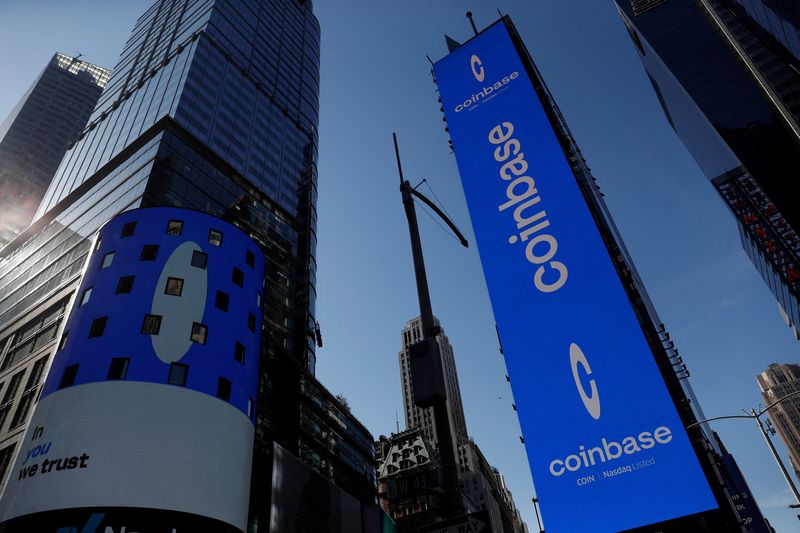 © Reuters. FILE PHOTO: The logo for Coinbase Global Inc, the biggest U.S. cryptocurrency exchange, is displayed on the Nasdaq MarketSite jumbotron and others at Times Square in New York, U.S., April 14, 2021. REUTERS/Shannon Stapleton/File Photo
2/2
© Reuters. FILE PHOTO: The logo for Coinbase Global Inc, the biggest U.S. cryptocurrency exchange, is displayed on the Nasdaq MarketSite jumbotron and others at Times Square in New York, U.S., April 14, 2021. REUTERS/Shannon Stapleton/File Photo
2/2
By Tom Wilson and Hannah Lang
LONDON/WASHINGTON (Reuters) - Coinbase (NASDAQ:COIN) Global has removed 'how to buy' instructions for at least three crypto tokens which have been the subject of 'rug pull' warnings that investors may lose their money, saying on Thursday it plans to improve safeguards.
Jaclyn Sales, a spokesperson for Coinbase, said the links were removed from the cryptocurrency exchange's website after they were brought to its attention this week by Reuters. There would also be an upgrade in safeguards on its auto-created webpages, she said.
Nasdaq-listed Coinbase features pages offering tips on investing in tokens and the pages in question were informational rather than making them available to trade on its app or wallet.
Sales said the pages, which contained a disclaimer that the information was not investment advice and that the exchange was not liable for "errors and delays", were created automatically from information carried by data website CoinMarketCap.
CoinMarketCap said it was not aware of the Coinbase pages and its vice-president of growth and operations Shaun Heng said there was not a partnership with Coinbase.
Sales said it was not clear whether Coinbase ran checks on the coins whose information pages it removed. Coinbase would "build a more robust disclaimer for the pages which are being auto-created," the exchange told Reuters on Thursday via email.
Coinbase would also "build a process to take down any other pages which CoinMarketCap has flagged as potentially being scams," it said, adding that "assets which relate to known scams were not tradeable on the exchange".
'RUG PULLS'
One page removed by Coinbase featured DeFi100 and told users to check CoinMarketCap to find out where it could be bought.
However, the DeFi100 page https://coinmarketcap.com/currencies/defi100/historical-data on CoinMarketCap warns: "We have received multiple reports that this project has exited as a scam. Please exercise caution."
CoinMarketCap, which does not sell cryptocurrencies on its site, says DeFi100's tokens have not recorded any daily trading volumes since Nov. 14.
DeFi100's website https://defi100.org and Medium blog page https://wrapp3d.medium.com are offline. Its last tweet was in May last year.
CoinMarketCap did not respond to requests for comment on DeFi100 or its warning.
Twitter (NYSE:TWTR) users alleged in May that DeFi100 had performed a "rug pull", where investors deposit money in phoney projects before a coin's developers make off with the funds.
DeFi100 denied the allegations in one of its last tweets https://twitter.com/DEFI100/status/1396439014178136065?cxt=HHwWgoCt6c_4kuEmAAAA, on May 23. Acknowledging investors had suffered losses, it said it hoped to "bring the project back on its feet".
It did not respond to Reuters requests for comment.
'MERCENARY'
Coinbase also took down a page featuring a token called Mercenary which, like DeFi100, was not available on Coinbase's app or wallet.
Mercenary launched in January, hitting a high of almost $20. But on Jan. 26 it fell within minutes from just over $8 to a fraction of a cent and its price has not since recovered, CoinMarketCap data shows.
Blockchain security firm PeckShield tweeted https://twitter.com/PeckShieldAlert/status/1486305364018556928?ref_src=twsrc%5Etfw on Jan. 26 that Mercenary had been hit by a rug pull and warned buyers off it.
Reuters could not contact Mercenary, while its website and Twitter page are both offline.
It is unclear when Coinbase launched its page on Mercenary, which archived webpages show CoinMarketCap first featured on Jan. 15. CoinMarketCap did not respond to a question on whether it had taken Mercenary off its system.
Coinbase has also taken down a page on a token named after Squid Game which crashed to almost zero in November in what cyber security experts said was another rug pull. It also was not available on Coinbase's app or wallet.
The website and Medium account behind the SQUID token were quickly taken offline after the project unravelled and remain down. Twitter also suspended the project's account, saying that it violated the network’s rules.
The developers behind SQUID said on Telegram in November that they were abandoning the token, saying "someone is trying to hack our project".

